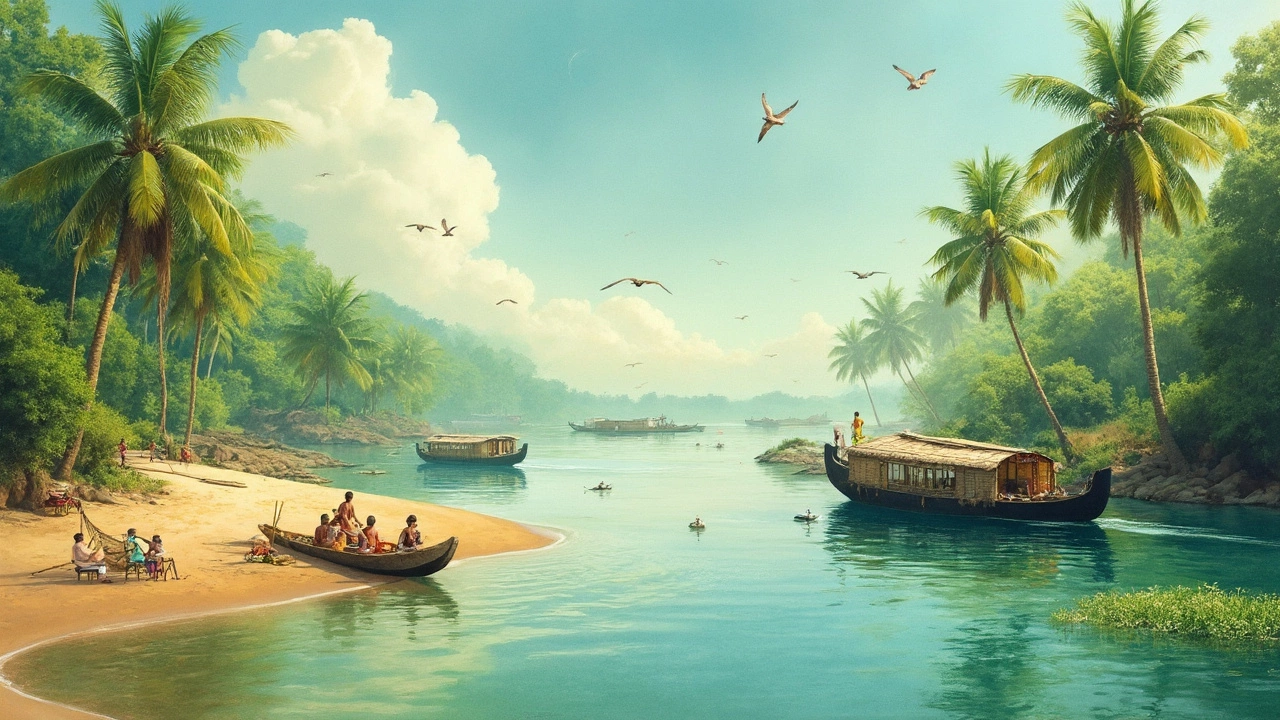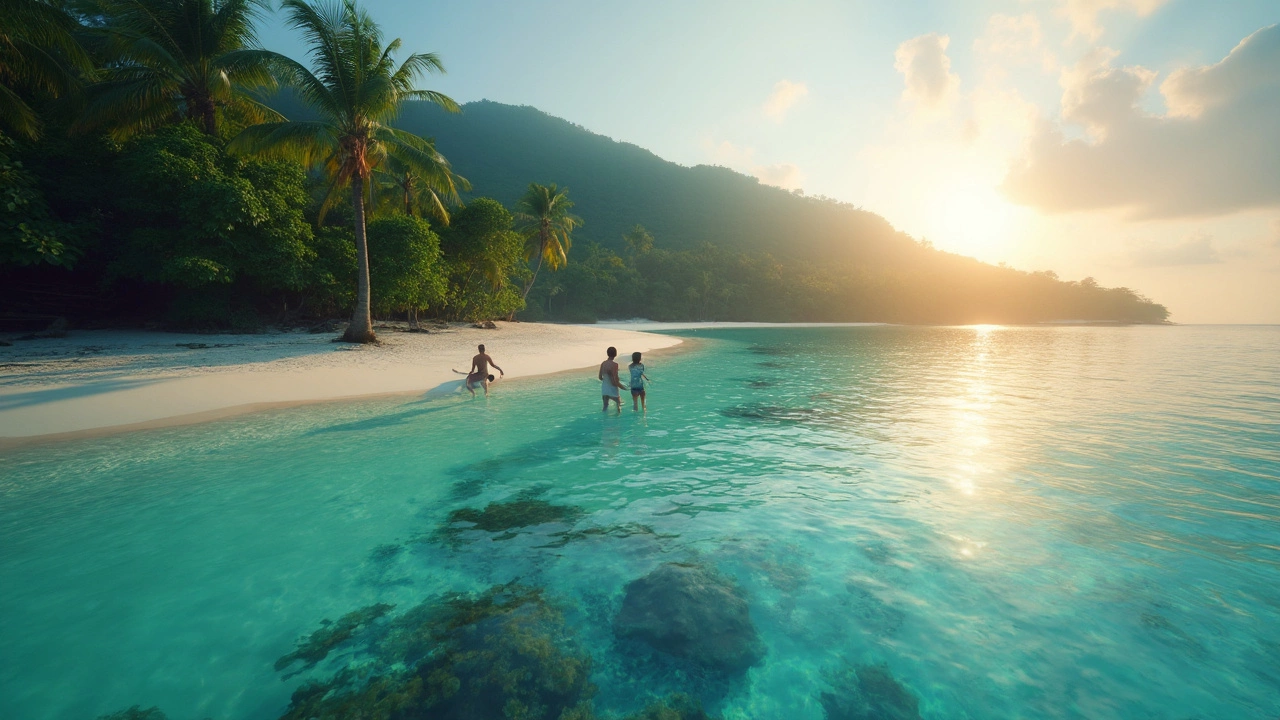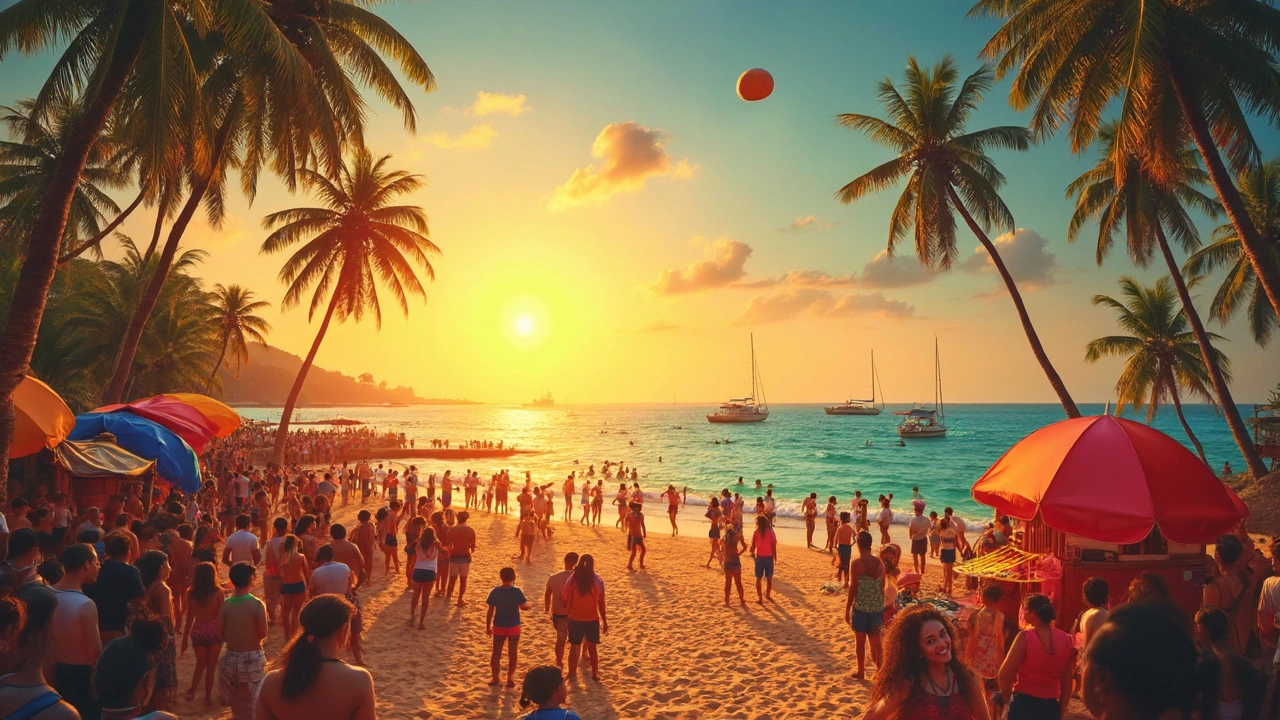India isn't all ancient forts and street food. The country's coastline packs some serious punch—think powdery sands, turquoise water, and palm trees as far as you can see. But here’s the catch: every region has its own vibe, so ‘most beautiful’ depends on what you’re after. Do you want all-night parties? Hidden, quiet coves? Or stretches of clean sand with barely a footprint?
With over 7,500 kilometers of coastline, figuring out where to start can feel overwhelming. Goa gets the most buzz, but that's just the tip of the iceberg. From wild parties in the west to laid-back beauty in the south and off-the-grid escapes on the islands, there’s loads to discover. And the best part: Indian beaches aren’t cookie-cutter. Each spot is different—some flaunt Portuguese architecture, others offer coconut-fresh breakfasts and water sports that’ll have your heart pumping.
If you’re plotting a beach escape, it pays to know what each region brings to the table—whether it's silent yoga mornings or underwater adventures. Stick around to see how these hotspots stack up, and score tips to pick the one that’s right for you.
- Why the Indian Coastline Stands Out
- Goa: The Ultimate Beach Playground
- Kerala: Where Beaches Meet Backwaters
- The Andaman Islands: Untouched Paradise
- Tips for Choosing Your Perfect Beach
Why the Indian Coastline Stands Out
When folks argue about which beach destinations India can claim as the most beautiful, it really boils down to variety and uniqueness. India has two massive coasts: the Arabian Sea to the west and the Bay of Bengal to the east. Then there’s the island territory in between. That’s a huge spread of different landscapes, cultures, and flavors all packed into one country’s shoreline.
Along the west coast, for example, Goa is known for its blend of European and Indian influences. You’ve got centuries-old churches sitting right by sunny beaches. Down south, Kerala is all about palm-fringed shores mixed with its famous backwaters—think rivers and lakes running parallel to the coast, perfect for houseboat stays. On the east, destinations like Pondicherry and the long beaches of Odisha show off French vibes and wide-open sands that often go ignored by tourists chasing crowds in the west.
A fun fact: India’s coastline runs for about 7,516 kilometers, according to the Geological Survey of India. That’s longer than the coasts of Italy and Greece combined. Plus, the country packs in eight major beach states (including islands) and more than 200 different beaches that’ll leave you with totally different stories to tell.
“What really sets Indian beaches apart is that every region has its own micro-culture. You’ll find Portuguese-inspired shacks in Goa, fishing villages in Tamil Nadu, and untouched coral reefs in the Andamans—often just a few hours’ flight or drive apart,” says Sudeep Paul, a travel expert who’s clocked up visits to more than 50 beaches across the country.
If you’re all about beach variety, India’s coast wins hands down. You can hop from party zones to yoga retreats to sleepy fishing towns without ever leaving the water’s edge. Just pack your sunscreen and a sense of curiosity. There’s a reason these beaches are making it to travel bucket lists worldwide.
Goa: The Ultimate Beach Playground
Goa isn’t just the most hyped beach spot in India—it’s the go-to for anyone who wants a little (or a lot) of everything. Whether you’re into lively parties, laid-back fishing villages, or family-friendly sands, Goa puts it all out there. Over three million travelers hit up this state each year, and a big chunk of them keep coming back.
The stretch between Candolim and Baga is like India’s own mini Ibiza. Here, beach shacks dish out prawn curry, DJs spin all afternoon, and water sports like parasailing and banana boat rides are basically everywhere. But if you’re looking for something chill, swing by Palolem or Agonda in South Goa—these spots are all about quiet sunsets and hammocks.
“Goa is not just a destination, it’s a state of mind—an escape where everyone finds their own beat.” — Conde Nast Traveller India
What’s wild is that Goa’s beaches aren’t all copy-paste. Here’s how a few of them roll:
- Calangute: Super popular, packed with water sports, lots of shops and cafes nearby.
- Baga: Known for its legendary nightlife, Tito’s Lane is the place to be after dark.
- Anjuna: Famous for its flea market (every Wednesday), backpacker crowd, and trance parties.
- Palolem: Perfect for couples or anyone wanting peaceful mornings and yoga on the sand.
It isn’t all about the sand, though. Historic forts, Portuguese churches, and spicy seafood thalis fill in the gaps between beach-hopping. Plus, getting around is easy—rent a scooter for about ₹400 a day and cruise from beach to beach at your own pace.
| Beach | Best For | Average Price (per night, budget stay) |
|---|---|---|
| Calangute | Families & water sports | ₹1,200 - ₹2,000 |
| Baga | Nightlife | ₹1,500 - ₹2,500 |
| Palolem | Peace & yoga | ₹800 - ₹1,800 |
| Anjuna | Markets & parties | ₹1,000 - ₹2,000 |
One thing to keep in mind: Goa has a peak season (November to February) when prices and crowds hit their highest. If you visit during the monsoon (June to September), you’ll get the beaches almost to yourself, but swimming can be risky and a lot of beach shacks shut down. For most travelers, timing is everything.
So if you want a spot that does it all—hectic parties, chill vibes, water sports, good eats, and easy travel—beach destinations India don’t get better than Goa. Just come with an open mind and a healthy appetite.

Kerala: Where Beaches Meet Backwaters
Kerala does things differently. This state, right along the southwestern coast, is famous for mixing up beaches, palm forests, and long stretches of backwaters. You won’t just find sun and sand—you get this wild combination where river-like lagoons meet the Arabian Sea. Think of it as a beach holiday with extra perks.
Most travelers start with Varkala and Kovalam. Varkala Beach is set on cliffs overlooking the sea, so every sunset feels epic. Plus, it’s less crowded than Goa. Kovalam, a bit closer to the capital city Thiruvananthapuram, has gentle waves and a string of seafood shacks that’ll make you rethink what fresh fish tastes like. Both spots rent out scooters and surfboards—local shops don’t mind if you want to try surfing after morning yoga.
What really makes Kerala different? It’s the network of palm-lined backwaters running behind the beaches. Places like Alleppey (Alappuzha) let you hop on a houseboat and cruise past villages, paddy fields, and tiny floating shops. It’s peaceful, and you can even sleep right on the water. Locals say the best way to see Kerala is from one of these boats—it beats any hotel.
If you want more than just sunbathing, Kerala scores pretty high for water sports. Kayaking in Ashtamudi Lake, paragliding at Varkala, and even scuba at Kovalam are all doable. The beaches here are much friendlier for families and solo travelers—locals go out of their way to help.
| Beach | Main Attraction | Best Time to Visit | Special Tip |
|---|---|---|---|
| Varkala | Cliff views, cafes, surfing | October to March | Catch the local fish fry at shack cafes |
| Kovalam | Lighthouse, calm waters, Ayurveda spas | September to March | Try an authentic Ayurvedic massage at a beachfront spa |
| Marari | Quiet, clean, close to Alleppey backwaters | November to March | Stay overnight in a beach homestay for local meals |
One more thing—Kerala is serious about clean beaches. The state even banned single-use plastic on the coasts in 2020. Want quiet mornings, friendly faces, and something more than just lying on sand? You’ll find this stretch of India delivers.
For anyone looking for beach destinations India that offer both adventure and relaxation, Kerala is a solid bet. Just don’t forget the mosquito repellent for those backwater nights!
The Andaman Islands: Untouched Paradise
When it comes to remote beauty, the Andaman Islands are in a league of their own. Sitting way out in the Bay of Bengal, about 1,200 km from mainland India, this spot often flies under the radar for people looking up beach destinations India. But if you want turquoise water, coral reefs, and sand so clean you could eat off it (not recommended, but you get the idea), the Andamans deliver big time.
The big draw here is Havelock Island, which has grabbed global headlines for Radhanagar Beach. In 2004, Time Magazine named it Asia’s best beach. The sand feels like talcum powder, and the sunsets look straight out of a travel ad. Snorkeling and diving are huge, especially at Elephant Beach and Neil Island, where clear water and lively reefs make it easy to spot clownfish, turtles, and even the odd manta ray. No scuba certificate? No problem—tons of shops run beginner courses and fun dives.
The Andamans avoid messy crowds you’d see in places like Goa. There are strict no-plastic zones, and most beaches are kept free from noise and trash. If you’re after privacy, you’ll love the small boutique resorts and eco-lodges dotted around the islands. Just know the internet can be slow, which might be a blessing if you actually want to unplug.
- Ranganath and Long Island are even less touristy—perfect for kayaking and hiking, especially if you’re up for spotting wild deer or watching the bioluminescence on certain nights.
- Cellular Jail in Port Blair is worth a quick stop, not just for history buffs but anyone curious about India’s freedom struggle.
- Local ferries are the best way to island-hop but book tickets early—especially in peak season (November to April).
- The seafood is fresh, cheap, and tasty. Try local fish curries or simple grilled catch straight off a beach shack grill.
Traveling here takes some planning—flights only go to Port Blair, and you’ll use boats for most other islands. Foreigners need a special permit, but you can get it at the airport. Pack reef-safe sunscreen, cash (ATMs are scarce), and a good mosquito repellent. For anyone craving beaches that feel like your own private patch of paradise, the Andamans are tough to beat.

Tips for Choosing Your Perfect Beach
Picking the right beach isn't just about scrolling through pretty Instagram shots. Each spot in India has its own flavor, so figuring out what you want upfront saves you hassle. Are you after buzzing nightlife or total peace and quiet? Want family fun or solo adventure? Here’s what to think about before booking that trip.
- If you’re the party type, Goa’s Baga and Anjuna beaches are packed with music, shacks, and nightlife. South Goa is calmer, so it’s better for those craving less crowd and more nature.
- Love nature and activities like kayaking or houseboat rides? Kerala’s Varkala and Kovalam beaches blend chill vibes with some cool water sports. The seafood there is next-level fresh.
- If your idea of paradise is untouched sand and crystal water, the Andaman Islands deliver. Radhanagar Beach on Havelock Island actually bagged a spot in Time Magazine’s “World’s Best Beaches” list in 2004. You can go snorkeling with colorful fish or just swing in a hammock.
- For families, look for beaches with lifeguards, quieter waves, and nearby food options. Palolem (Goa) and Marari (Kerala) tick these boxes.
- Always check the season before planning—Goa and Kerala’s best months are October to March. The Andaman Islands are great almost all year, but skip the monsoon months (June-August) to avoid choppy waters.
Facilities also matter—some beaches are all about eco-resorts, while others have plenty of budget shacks. If you’re after privacy, research ahead or ask locals about those lesser-known beaches. A beach that’s empty on weekdays can become packed on weekends.
Here’s a quote that sums it up. According to Lonely Planet,
“No two Indian beaches are alike—some are feast for the senses, others are perfect for losing track of time with a book. Where you go should match what you want out of your trip.”
At the end of the day, choosing the right beach destinations India isn’t about following the crowd. It’s about finding the vibe that feels just right for you.
